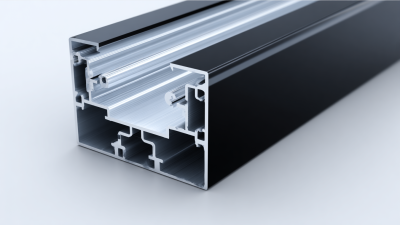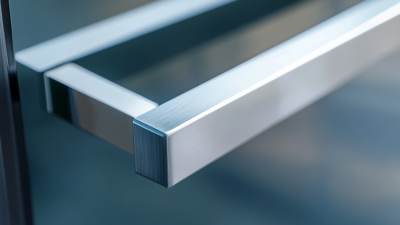In today's competitive global market, the importance of energy efficiency and design versatility cannot be overstated, particularly in the realm of home and commercial building solutions. One product that has gained significant traction among buyers worldwide is the Insulated Casement Window Profiles. These innovative window profiles not only enhance thermal performance but also contribute to a home's aesthetic appeal and overall value. Offering a perfect blend of style and functionality, insulated casement windows are designed to provide superior insulation, helping to reduce energy bills and improve indoor comfort. As global buyers become more conscious of energy consumption and sustainability, understanding the multifaceted benefits of Insulated Casement Window Profiles becomes essential. This blog will delve into the various advantages these window profiles offer, highlighting their significance in modern architecture and construction trends.

Insulated casement windows have become increasingly popular among homeowners, not only for their aesthetic appeal but also for their impressive energy efficiency. According to the U.S. Department of Energy, windows account for approximately 25-30% of residential heating and cooling energy use. By investing in insulated casement windows, homeowners can significantly reduce energy costs. Studies show that these windows can improve energy efficiency by up to 30%, thanks to their multi-chambered frame design and advanced glazing options.
Furthermore, a report from the Efficient Windows Collaborative indicates that insulated casement windows can lead to energy savings of up to $465 per year in climates with high heating demands. Additionally, the incorporation of low-emissivity coatings and argon gas between the panes enhances thermal insulation, resulting in better overall performance. This combination of features not only makes insulated casement windows a cost-effective choice but also contributes to lower carbon footprints, aligning with global trends towards sustainability. By prioritizing energy-efficient window solutions, buyers can invest in properties that are not only more comfortable but also more environmentally responsible.
| Benefit | Statistic/Insight | Impact on Energy Efficiency |
|---|---|---|
| Reduced Energy Consumption | Up to 30% reduction in heating costs | Significant savings on energy bills |
| Improved Insulation | Insulation R-value of 5 or higher | Enhanced thermal barrier, reducing heat loss |
| Lower Carbon Footprint | Potential to reduce CO2 emissions by 1,000 kg/year | Contributes to sustainability efforts |
| Noise Reduction | Up to 50% noise reduction | Creates a quieter living environment |
| Increased Home Value | Home value increase of 5-10% | Adds value to property, appealing to buyers |
The demand for insulated casement window profiles is on the rise globally, driven by increased awareness of energy efficiency and environmental sustainability. As consumers and builders alike prioritize energy-saving solutions, insulated windows are gaining traction for their ability to minimize heat transfer, ultimately leading to reduced energy costs. This growing trend is present not only in residential construction but also in commercial projects, where the emphasis on creating energy-efficient buildings is paramount.
Market research indicates that consumers are now more inclined to invest in high-quality windows that enhance thermal performance and provide better noise insulation. Innovations in materials and technologies are making insulated casement windows more accessible and appealing. Additionally, manufacturers are adapting to changing regulations and the demand for sustainable products by introducing eco-friendly manufacturing processes, further boosting the attractiveness of these window profiles in the marketplace. As this trend continues, global buyers can expect a wider variety of options that not only meet performance standards but also align with their sustainability goals.
When it comes to choosing windows for your property, the debate between insulated casement windows and traditional designs is worth exploring. Insulated casement windows stand out for their impressive energy efficiency, significantly reducing heat loss and keeping homes warmer in winter and cooler in summer. In contrast, traditional windows often struggle with insulation, leading to higher energy costs and less comfort. The unique sealing mechanism of casement windows ensures a tighter fit, which enhances soundproofing and protects against outside elements.
**Tips:** When selecting windows, consider the climate of your area. For regions with extreme temperatures, insulated window profiles can provide long-term savings on energy bills. Additionally, look for windows with high Energy Star ratings to ensure optimal performance.
Another advantage of insulated casement windows over traditional designs is their durability and low maintenance requirements. The materials used in insulated profiles are often resistant to fading, warping, and corrosion, ensuring your investment lasts longer. Traditional windows, particularly wooden frames, may require regular painting and sealing to maintain their integrity, while insulated options often only need periodic cleaning.
**Tips:** Always assess the warranty and lifecycle of the window designs you consider. Investing in durable, low-maintenance options can save time and money in the long run. Moreover, exploring local suppliers who specialize in insulated options can provide insights into the best choices for your specific needs.

Advanced insulation plays a crucial role in the performance and sustainability of insulated casement window profiles, making them an attractive option for global buyers. According to a report by MarketsandMarkets, the demand for energy-efficient windows is projected to grow significantly, highlighting the importance of materials that enhance thermal performance. Insulated casement windows can achieve U-values as low as 0.2 W/m²K, ensuring minimal heat transfer and contributing to reduced energy costs. Utilizing materials such as low-emissivity (Low-E) glass and multi-chambered frames, these windows effectively maintain indoor temperatures, fostering a comfortable living environment.
Tip: When selecting insulated casement windows, look for certifications like ENERGY STAR to ensure you are investing in products that meet rigorous energy efficiency standards.
In addition to performance benefits, the adoption of advanced insulation materials is vital for sustainability. A study from the International Institute for Sustainable Development shows that energy-efficient buildings can reduce greenhouse gas emissions by up to 40%. By choosing high-quality insulated windows, buyers not only enhance their property's energy performance but also contribute to global sustainability efforts.
Tip: Consider local climate conditions when selecting window profiles, as tailored solutions can provide optimal energy savings and comfort.
Insulated casement windows offer significant long-term savings that appeal to global buyers looking for energy-efficient solutions. Unlike traditional window options, insulated casement windows are designed to provide superior thermal performance, effectively minimizing heat loss in winter and reducing heat gain during summer. This enhanced insulation means that homeowners can enjoy a more consistent indoor temperature, leading to reduced reliance on heating and cooling systems. Consequently, this results in lower energy bills over time, making these windows a smart investment.

Additionally, the durability of insulated casement windows adds to their cost-effectiveness. These windows are built to withstand harsh weather conditions and resist wear and tear, which minimizes maintenance costs and prolongs their lifespan. As they enhance the home’s overall energy efficiency, buyers not only benefit from lower utility expenses but can also enjoy potential increases in property value. This combination of savings on energy bills and the long-term investment in window quality makes insulated casement windows an attractive choice for conscientious homeowners around the world.






